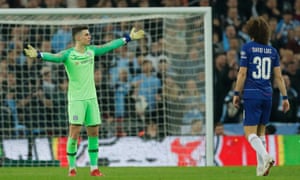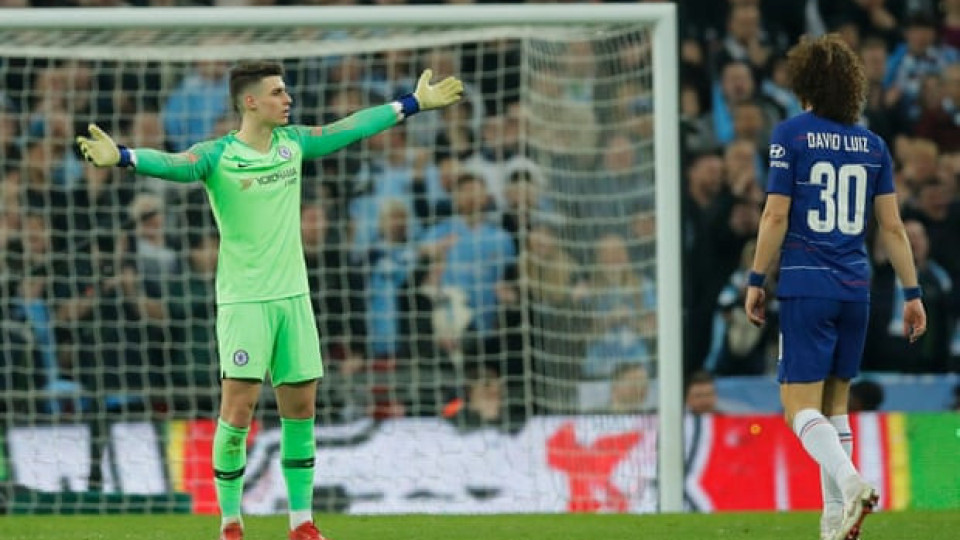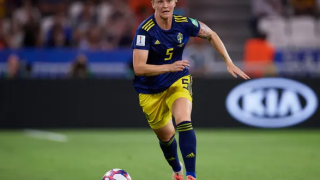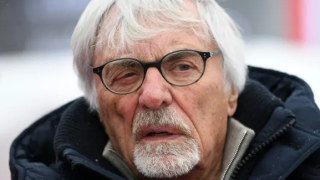
Refusal of keeper to be substituted near end of extra time undermined manager’s good work in League Cup final
At times during his winter dissolve on the Chelsea touchline Maurizio Sarri has had something of the tracksuit-clad King Lear about him, striding his chalk square, whipped by the to-and-fro conflicting winds, raging at ingratitude and insubordination. By the end of this Carabao Cup final he had been transformed into something else, something more terminal; had become instead the fool.
Poor Sarri. For the preceding two hours his players had given the impression of playing for their manager, of a sense of unanimity. As the second half wound down Chelsea had the better, just about, of a scoreless game, with a feeling of something emerging, a shape beginning to clarify.
In a moment of extra time in extra time that chimera fell away. Basically, Kepa Arrizabalaga refused to come off the pitch. He was substituted by his manager. But then he wasn’t. This was a substitution that became a non‑substitution, a substitution that was declined, swatted away with a swish of the glove.
'Poor Sarri. This really was the final, and very public, indignity'
Three times Sarri approached the touchline and signalled for his goalkeeper to go. Next to him Willy Caballero stood awkwardly, looking at his feet, a lime-green gooseberry caught between his raging manager and a 23-year-old goalkeeper who refused to bow to the chain of command.
Watching this it was impossible not to feel a curling of the toes. In the under-12s Arrizabalaga would have been led off by the referee or his mum. At Chelsea he stayed on, the world’s most expensive goalkeeper under a manager still paddling for air. How is this one going to play out?
Afterwards Sarri was conciliatory. He handled it brilliantly in fact. He called the moment a misunderstanding, said that Arrizabalaga “was right, but in the wrong way”. Arrizabalaga had gone down with cramp, then recovered. Sarri saw that in retrospect Arrizabalaga was fine to stay on.
Either way, to refuse to leave the pitch when ordered to go is unheard of. Certainly unheard of by Sarri, whatever he might say afterwards. He flailed his arms, screamed in rage, kicked things, wandered off almost down the tunnel. As the final whistle blew the manager was held back from engaging with his goalkeeper by Antonio Rüdiger.
And in that moment the feeling of a ship whose captain had briefly resumed the wheel was pretty much dashed. So much about a shootout is to do with certainty and calm, the feeling that victory is at hand. Think of Gareth Southgate with his managing the manageables, planning every detail from the ring walk to who stands where. A stand-up row with a raging manager, a mutinous keeper, teammates keeping them apart: these aren’t quite the marginal gains we had in mind, Maurizio.
Presumably Roman Abramovich was tuned in to all this, buffering his live feed in the cinema room of his super yacht somewhere near the equator. It is to be hoped Abramovich caught the rest of the game too, because until that moment his team had seemed to be getting somewhere. There had been a fear Chelsea might be eviscerated by Manchester City on this huge green spring-like pitch. Instead they grew into the game steadily, helped by selection and tactics that had a note of pragmatism when it mattered. For a man who never changes, Sarri changed here.

The whole left side of his team, as brittle as a brandy snap in Manchester two weeks ago, was junked and replaced, albeit the first sight of Chelsea’s team caused a mass social-media sass at the sight of Eden Hazard as a false nine.
At first glance this looked a fairly horrible decision, a case of spiking your own most powerful gun. But this was where Hazard had played when Chelsea beat City 2-0 at Stamford Bridge. More to the point, Sarri was also camouflaging a weakness.
Quick guide
Follow Guardian sport on social media
A system badly implemented is always a bad system, and at the Etihad Hazard had done a lot of standing around while the game happened quite near him. Marcos Alonso might not be the greatest defensive left-back. With no cover he looks like a man viewing the game through a film of extra thick custard. The change worked here. For a while nothing happened. Then nothing kept on happening. The shapes moved, coloured dots on a grid picked out against the green. The crowd chuntered and rumbled at the edge of things.
Either way, 0-0 at half‑time felt like a step-up against the champions. And so it continued. On 51 minutes nothing happened. On 52 minutes nothing happened. On 53 minutes something happened. It was Hazard, finally getting away in his favoured left-hand channel. Kyle Walker has seen this movie before. Hazard went to cut inside, as he always cuts inside, but was crowded out.
And as the game entered its final third it was Chelsea who were starting to carry the weight of the play. Win or lose, there would surely be solace here for Sarri, a sense of progress, of a team called to heel.
At which point, enter Arrizabalaga. The Chelsea dressing room has been described as toxic, as a place where managers are flushed out, rat traps laid. This was gentle by comparison, and much worse, Arrizabalaga shooing his manager away as though bothered by a troublesome uncle.
That City held their nerve and took the shootout was no surprise. This is a wonderful team, ticking off the first note of triumph in a season that could yet yield an astonishing bounty. For Chelsea it felt by the end like another note, albeit a comic one, in Sarri’s own drama of departure.
The Guardian











Leave a comment